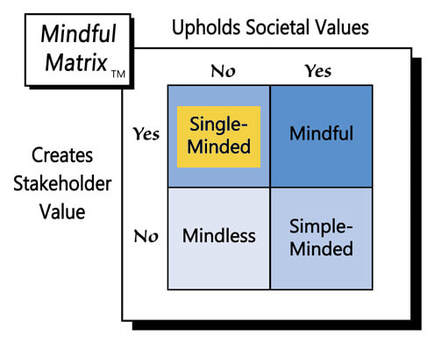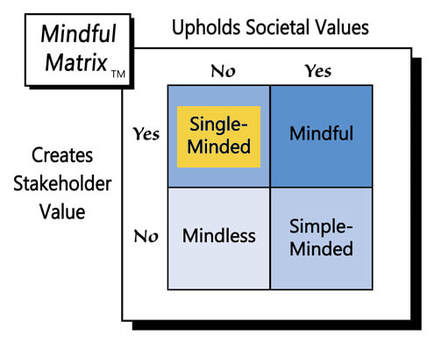author of Honorable Influence - founder of Mindful Marketing
Principles of marketing professors teach that “products” are more than tangible goods; they’re also services and ideas. While it’s easy to identify organizations marketing goods and services, noticing idea marketing takes more discernment. Recently, the world witnessed one of the most blatant examples of idea marketing ever. It worked but unfortunately not for good.
In the annals of persuasion, one of the hardest ‘sales’ must be convincing one’s country to start a war, given the likelihood of loss of life, property, political allies, and more. In persuading Russia to invade Ukraine, Vladimir Putin, achieved such a seduction, while providing an example of idea marketing at its worst.
Of course, Russia’s largely autocratic regime doesn’t require the consensus-building demanded in a democratic state. Still, Putin was undeniably successful in marketing a momentous idea by convincing other government officials, military leaders, and to some extent the Russian populace to embrace the notion that invading Ukraine served a national security interest while accomplishing historically based cultural and ethnic reunification.
Mindful Marketing rarely tackles politics. I’m addressing this situation not just because it’s a poignant example of idea marketing but because of its significant human and economic impact, as well as its potential to become one of history’s biggest geopolitical events.
Russia’s incursion into Ukraine is also personal for me. Both of my wife’s parents were born in Ukraine, where they endured extreme hardships during WWII. Consequently, my wife and our children share Ukraine’s rich cultural heritage by birth, as I do by marriage.
The necklace in the picture above is my wife's tryzub, which her father brought back for her from one of his many return visits to his homeland.
Of course, millions of others also have personal connections. In fact, as I was writing this article, I read a post by one of my LinkedIn connections, Cait Mack who wrote:
“This has been one of the worst days of my life. The war in Ukraine feels like it’s pulling at the very fiber of my being. For those who don’t know, I’m Ukrainian. My grandparents came over during WW2, fleeing from Nazis. I am sick with grief. Everything feels so stupid and trivial in comparison to what’s going on over there.”
“I think of my grandparents. Our extended family in Ukraine. All the innocent people. The parents with their children. The harsh reminder that we can’t really keep our families safe.”
As Mack mentions, the secondhand angst that any of us feel can’t compare to the fear and horror that those in Ukraine are experiencing, which reminds me of the focus of this piece—Putin marketing the idea of invasion.
Rather than commending his cunning, the intent here is to extract something edifying from the unfolding tragedy—to identify how individuals and organizations should market ideas responsibly.
Autocratic leaders have the advantage of superior political power. Marketers enjoy information superiority, i.e., they naturally know more about their organization and its products than do consumers.
Because of their very intangible nature, the information imbalance involving ideas becomes even more skewed, which means marketers are under even greater moral compulsion to carefully steward their influence on the conceptions of others. The following are five steps toward marketing ideas responsibly:
1. Seek Understanding
It’s hard to understand when uninformed, which is why the first act in understanding is gaining information by researching the issue at hand and, above all, listening to those closest to it.
Courtroom dramas sometimes culminate with an attorney introducing a new witness or piece of evidence, which unexpectedly changes the minds of jurors. Such are likely violations of legal discovery, but the examples are helpful reminders that additional and possibly more accurate information can help change our minds for the better.
2. Explore Other Perspectives
As implied above, it’s helpful to lean on others, not just because they can provide additional facts but because they might offer their own experienced and informed interpretation of the information. Whether at the boardroom level or shop floor level, the best leaders always avail themselves of others’ insights.
It sometimes seems that people avoid other perspectives, fearing they’ll change their opinions. That may happen, which is not necessarily a bad thing. However, seeking others’ perspectives is often like a fan who's loyal to a certain football team watching two other teams play. Watching them will probably not change the fan’s team loyalty, but they may see in the other teams things that enhance their understanding of the game, as well as things their team does well or could do better.
3. Present a Rational Argument
People can be persuaded in different ways, including by deception (painting an inaccurate picture of facts) and coercion (compelling an action from a position of power). Neither of these alternatives allows people to exercise informed consent, or freely choose to adopt an idea based on its logical merits.
Although we occasionally act otherwise, people are rational beings who can understand and make sensible decisions based on logical arguments. Even young children comprehend reason—‘If you eat your whole meal, you’ll get to have dessert.’ People of any age deserve clear, logical, communication.
4. Don’t Play on Emotion
However, humans aren’t simply rational beings. Our complex psychology also includes emotion, which makes us even more interesting. Yes, we should make most decisions by reasoning with objective information, but sometimes it’s appropriate for people to choose things that they enjoy or that make them happy, like playing a favorite game with a friend.
What’s unacceptable is to use others’ emotions against them, e.g., to persuade them to do something out of an irrational fear or a sense of guilt. Although good in moderation, too much emotion can cloud people’s thinking and cause them to do things that they otherwise would not rationally choose. The outcome is like a doctor tapping a patient’s knee with a reflex hammer: Their leg will move involuntarily no matter how much the patient may reason that it shouldn’t.
5. Be Truthful
The fifth act encapsulates the preceding ones and should go without saying; however, even when people fulfill the first four steps, they still must ensure follow-through of this final one, particularly to avoid selective presentation of facts.
For example, I could support the morality of advertising by referencing Gallup’s annual poll about the honesty and ethics of various occupations and accurately report that advertising practitioners ranked in the top 20 of all occupations. That may sound impressive, but the statement would be misleading because the survey only asked about 22 occupations and advertising practitioners ranked 18th.
What we don’t tell people is often as important as what we tell them.
Again, the point of this piece has not been to detail Putin’s tenuous argument for the invasion of Ukraine; however, this website, among others, provides a window into how his rationalization evolved. In short, Putin appears to have violated more than one of the preceding five steps; for instance, he played on his own people’s emotion with a “rousing speech” in which he called Ukraine a U.S. colony ruled by a “puppet regime.”
From my own reading and experience, Putin’s biggest breach of the steps of responsible influence has been of #5, by being untruthful, particularly with respect to his denial of Ukraine’s historic statehood and his claim that Russians and Ukrainians ‘are one people.’
Soon after my wife and I started dating, I learned two important facts involving her family’s ethnic heritage. First, the nation is not “the Ukraine;” it’s “Ukraine.” Adding the definite article “the” diminishes the country’s stature to that of a territory or colony, (e.g., the Louisiana Territory, the Yukon), which Putin directly suggested in his “rousing speech” referenced above.
Second, my wife’s family and their friends frequently reinforced that ‘Ukrainians are not Russians.’ I experienced firsthand that Ukrainians have a unique language, history, food, customs, and other rich cultural distinctives that distinguish them from their homeland’s northern neighbor.
My evidence spans more than three decades, but it is personal and, therefore, anecdotal. The most compelling proof of Putin’s misinformation is, regrettably, what’s happened during the invasion, as a 2/26 New York Times Breaking News headline read, “Ukraine, outmanned and outgunned, has slowed Russia's advance on Kyiv and two other cities as its forces wage a ferocious resistance.”
If Ukraine were just a Russian territory, if the majority of Ukrainians wanted unification with Russia, and if Ukrainians and Russians were one people, why are so many Ukrainians valiantly fighting and giving their lives to stop the invasion and maintain their nation’s sovereignty?
The disconnect stems from a lack of truthfulness, which many of Putin’s own people have recognized, hence widespread protests by Russians against the “war without a cause.”
Tragically Putin was effective in selling the idea of invasion to some, at the cost of many lives and the freedom of a peaceful people. That underlying deception and unimaginable destruction makes his strategy the worst example “Single-Minded Marketing.”
Learn more about the Mindful Matrix.
Check out Mindful Marketing Ads and Vote your Mind!









 RSS Feed
RSS Feed